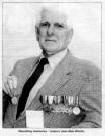
One Of The Worst Convoy Disasters
Alan recalls one of worst convoy disasters of the war
by JAKKI BLACK
 THIS
week marks the 60th anniversary for 50 Royal Navy heroes who ferried
crucial supplies to Russia during World War Two.
THIS
week marks the 60th anniversary for 50 Royal Navy heroes who ferried
crucial supplies to Russia during World War Two.
One of those veterans is Lisburn man Alan Elliott who vividly remembers the horrendous Arctic conditions and some of the war's most brutal sea battles.
Alan, who was with the Merchant Marine from 1940 to 1947, was presented via the Russian Embassy in London with a medal in 1994 to mark the 40th anniversary of the end of World War 11.
Alan was just 16 when he joined the Merchant Marine, having completed a radio operator course run by the Marconi firm in Belfast. On his many voyages he visited places like India, South Africa, South America, New Zealand, Canada, the United States and then to North Africa following the Allied landings and then came his service on the Russian convoys. He sailed on one of the original convoys to the Soviet Union-carrying essential supplies, these were a response from Britain and America to Stalin's appeal for help following the German invasion in June 1941.
Alan's ship the British vessel, the River Afton on which he was a radio officer, was part of the convoy PQ17 - the 17th to go to Russia.
The convoy of 24 American, eight British, one Dutch and two Russian vessels carrying tanks, aircraft, munitions and food supplies, set sail from Iceland at the end of June 1942. A few days out, north of Iceland in the Baring Sea, they were spotted by German aircraft and soon came under attack by planes and U-boats.
"By the third day out a running battle had begun," recalled Alan.
Convoy
"A convoy is made up of four or five rows of ships and outside that you have a variety of escort vessels -mine sweepers, anti -aircraftships, antisubmarine trawlers, along with corvettes and destroyers. Beyond that there are the cruisers for protection against enemy battle ships.
"It was suspected that German battle ships, including the Tirpitz, were on the way, so the naval escorts moved off to engage them and then the subs moved in to pick us off."
This left us largely defenceless and the convoy was ordered to scatter and make their own way to destinations on the Russian coast.
Several merchant ships were sunk, most of them American, with the ironic coincidence of it being July 4, American Independence Day.
Alan was soon to have his own experience of having your ship blasted out of the water.
"Three torpedoes hit our ship and she began sinking. I remember a lifeboat being lowered, there were 20 men in it, but it overturned and they all drowned. The ships were still moving you see, doing 10 knots, so in no time they were two miles further on.
"For me at that point it was just a matter of jumping over the side.
Swimming
"The ships all carried lifeboats and rafts so after half an hour of swimming around I managed to get on a raft, and five hours later we were picked up by the Royal Navy corvette, Lotus."
Alan was ferried to the Russian island of Novanya Zemblya, where the convoy reformed, but en-route to the port of Archangel they were spotted again and attacked for a full day by German aircraft resulting in another ship sinking.
When they reached dry land the survivors were allocated rooms in an hotel in Archangel, run by InTourist, the state organisation for dealing with foreigners.
"The Russians were very friendly but the poor souls had nothing them selves. Once a week, groups of Russians were allowed into the hotel on a rota basis to get a proper meal," said Alan.
Rooms
He and his crewmates were put up in small rooms, with two to a room. There was very little elbow room and lots of bugs.
After two months of rest and recuperation, Alan and the other survivors of the PQ 17 rejoined their ships and set sail for home. Unfortunately the journey home proved to be treacherous with three ships, including a destroyer being torpedoed on one day, three more being hit the next day with some of the men who survived the first attack on PQ 17 being killed on the way home.
Only seven merchant ships survived the outward journey of convoy PQ 17 - 26 ships in all were sunk in what was one of the worst convoy disasters of World War 11.
Alan is still a very active man and a well known and respected face in Lisburn. It is with a mixture of joy and sadness that he remembers his survival during those terrible dark days of war, joy that he survived and sadness for those unfortunate men who never did return home.
Ulster Star
07/09/2001
